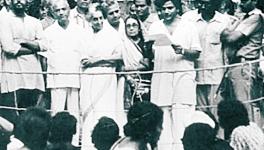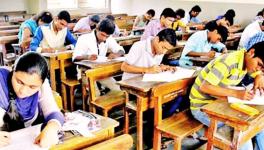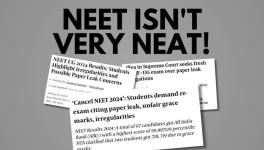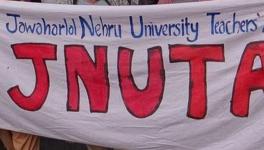DU: Admissions in December, Exams in February; Students rally against FYUP
New Delhi: After braving much hassle to get admission to Delhi University, Sneha’s immediate concern for her undergraduate studies remain the upcoming exam in February and the palpable feeling that she may not perform up to expectations. In the imminent weak performance, it’s not her but the structure to blame. Sneha, a student of B. A (Honours) English at Zakir Hussain College, is a participant in the student rally organised by the Students Federation of India (SFI) on Thursday to protest the newly introduced Four-Year Undergraduate Programme (FYUP) in the university. Students maintain that the university administration, in its haste to implement Common University Entrance Test (CUET) along with FYUP, failed to arrange teachers and other resources for teaching students in the new structure.
Talking to NewsClick, she said, “we are nearing our examinations and almost 60% of classes are yet to happen. I am already losing my mental peace. After admissions in November, I am being compelled to take examinations. I have hardly attended any classes for financial
literacy as teachers are not available. Similarly, for subjects like Value Added Course paper and Skill Enhancement Course papers, a class can extend up to four hours in one go. Additionally, we need to submit our assignments and other test papers too. It’s a very chaotic situation.” In the new course structure, the students have to take papers from four pools of papers namely Value-Added Courses (VAC), Skill Enhancement Courses (SEC), General Elective Courses (GEC) and Ability Enhancement Courses (AEC).
Salman, another student from Zakir Hussain College has a similar complaint. He said, “I have core subjects in Political Sciences and
Arabic. My Political Sciences teacher got transferred and no replacement was provided. Now, there are no classes for political theory. The classes will go on till February 17 and then you need to appear for examinations. I am baffled about what I am going to write
in the papers! For Arabic, only six classes are left. In order to complete the syllabus, the teachers are taking classes for up to three
hours continuously without any breaks. Many students cannot bear this pressure. Similarly, core classes and VAC courses classes are highly disorganised. One class takes place at 8:30 AM, then 12:30 PM and at last 3:30 PM. You reach home in the evening. There is no time for personal things.”
Anushka Sinha, a student from Hindu College, is perturbed if her Cumulative Grade Point Average (CGPA) score will get affected. She said, “the student who needs to travel to areas far from the campus are getting it quite problematic. I got admission in November and after two months you are asking us to appear for examinations. Even admissions are taking place right now. I think this must stop.”
Marching students maintain that FYUP will affect students from marginalised and poorer sections too, given multiple entry and exit
points during the programme. As per the course structure suggested by New Education Policy (NEP), a student can exit at the end of the second, fourth, sixth and eighth semester respectively with their certificates, diploma, degree and degree with honours.
Mahina, a Master's student at the faculty of arts said that it was the responsibility of the government to prevent dropout of students owing to economic and social factors. “Here it is facilitating the dropouts. It never cared about providing scholarships, cheap hostels and affordable tuition fees. Rather, it is awarding them by offering these certificates and diplomas.”
Hailing from Kerala, she is equally disturbed by the fact that English is no longer available for AEC. “As per new guidelines, a student who studied Hindi up to class eight must take Hindi for AEC in order to get the degree. It is very problematic given students from southern India and North Eastern India do not know Hindi nor do they have any interest in pursuing it. It is perhaps the same agenda of one nation, one religion, and one language getting imposed in the university. It’s a central university so it must cater to students across India. You cannot behave like a state university.”
The rally stopped at the entrance gates of the Ramjas College to protest the mass-scale displacement of teachers in the ongoing
recruitment drive. As per data collated by teachers' organisations, 38 teachers were displaced in Ramjas College alone through interviews which many teachers term as being farcical and aimed at promoting favouritism and nepotism. Enraged over displacement, Ramjas College Staff Association President tendered his resignation.
Vikas Gupta, a teacher at History Department addressed the public meeting post-rally to emphasise that changes in the education sector should not be seen in singularity.
He said, “it is not mere coincidence that national educational policies, with similar framework and design and time frame, are
introduced in India, Pakistan and Nepal. It is driven by global capital to produce labour to be absorbed in industries and services
sector. As a teacher, why should I be concerned about their placements? My job is to enable them to excel in their subject. They
should think critically. They should be the masters of their careers if they want to pursue history, management or medicine. They do not want you to think critically because then you will question slavery which lower castes were subjected by upper castes, women by men and tribals by urban people.”
“We are also finding that disciplines are getting more rigorous. We have much more to ponder upon given the explosion of knowledge. The need of the hour was to give more time and resources to understand our subjects. Yet, you are given fewer credits to study. Second, the entire framework creates the illusion of choice for students. A student chose to pursue Economics honours. It was his choice. Now, you are compelling him that you should study subjects like VAC or SEC courses. Why should I choose courses that I deliberately left in my schools?”
He added that it is equally important to note that no stakeholders demanded four-year undergraduate courses. “Did the students demand it? No. Did Teachers ask for it? No. Then why is it being implemented? Then you are not telling students what they are going to study in a four-year programme. Admissions in undergraduate courses were done this year only on the basis of a one-semester syllabus. There are no even talks about the syllabus of the second semester!” he concluded.
Jitendra Meena, Delhi University Teacher’s Association (DUTA) Executive Member and a teacher at Shyam Lal College too addressed the students and highlighted that the experiments of destroying primary education are getting repeated in higher education. “It begins with quality deterioration. There has been increased pressure on colleges. At the time we are holding this meeting, several hundred teachers in 12 colleges funded by Delhi Government are not getting salaries for four months. Just imagine their ordeal and how they will be running their households. Still, they are giving their classes. Now, we are hearing again and again that NAAC has given colleges ranks up to A++ on the basis of teachers' strength, infrastructure and quality teaching. The latest round of ranking was the last round. Soon, the government may ask that if you are too good, why do you look towards us for funding? Arrange your own resources! There are murmurs of financially autonomous colleges. Who will be the biggest loser in this game? The students and their families.”
He added that publicly funded universities are subjected to sweeping changes which in turn affects their quality. Citing the example of
Delhi University, he said, “in 2010, the colleges shifted from Annual Mode to Semester Mode. Then FYUP was introduced in 2013. After it, the administration introduced a Choice-Based Credit System (CBCS) and then a Learning Outcome-Based Curriculum Framework (LOCF). Now we are back to FYUP. If you look at the profile of students admitted this year, one finds that diversity has completely vanished. Girls are missing in particular courses and colleges. Admissions are still going on and yet thousands of seats are vacant. Why? Because the students moved in large numbers to private universities and they are not willing to come
back after paying fees in lakhs. So, mindless experiments are imposed on ten lakh students and their families treated as Guinea pigs for the previous decade. I request you to keep fighting. Maybe we shall save something for future generations!”
Get the latest reports & analysis with people's perspective on Protests, movements & deep analytical videos, discussions of the current affairs in your Telegram app. Subscribe to NewsClick's Telegram channel & get Real-Time updates on stories, as they get published on our website.
























